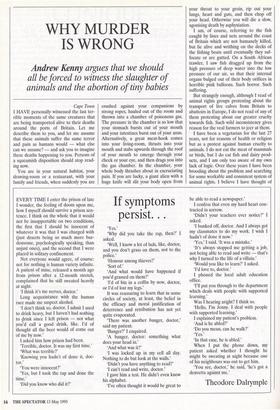If symptoms
persist.. .
EVERY TIME I enter the prison of late I wonder, the feeling of doom upon me, how I myself should survive a prison sen- tence. I think on the whole that it would not be insupportable on two conditions, the first that I should be innocent of whatever it was that I was charged with (just deserts being so much more bur- densome, psychologically speaking, than unjust ones), and the second that I were placed in solitary confinement.
Not everyone would agree, of course: not for nothing is human variety infinite. A patient of mine, released a month ago from prison after a 12-month stretch, complained that he still sweated heavily at night.
`I think it's me nerves, doctor.'
Long acquaintance with the human race made me suspect alcohol.
`I don't think so, doctor. I admit I used to drink heavy, but I haven't had nothing to drink since I left prison — not what you'd call a good drink, like. I'd of thought all the beer would of come out of me by now.'
I asked him how prison had been. `Terrible, doctor. It was my first time.' `What was terrible?'
`Knowing you hadn't of done it, doc- tor.'
`You were innocent?'
`Yes, but I took the rap and done the time.'
`Did you know who did it?' `Yes.'
`Why did you take the rap, then?' I asked.
`Well, I know a lot of lads, like, doctor, and you don't grass on them, not to the police.'
`Honour among thieves?'
`Sort of.'
`And what would have happened if you'd grassed on them?'
`I'd of bin in a coffin by now, doctor, or I'd of lost my legs.'
It was reassuring to learn that in some circles of society, at least, the belief in the efficacy and moral justification of deterrence and retribution has not yet quite evaporated.
`There was another banger, doctor,' said my patient.
`Banger?' I enquired.
`A banger, doctor: something what does your head in.'
`And what was it?'
`I was locked up in my cell all day. Nothing to do but look at the walls.' `Didn't you have anything to read?' 'I can't read and write, doctor.'
I gave him a test. He didn't even know his alphabet.
`I've often thought it would be great to be able to read a newspaper.'
I confess that even my hard heart con- tracted in sorrow.
`Didn't your teachers ever notice?' I asked.
`I bunked off, doctor. And I always got my classmates to do my work. I wish I hadn't of done it now.'
`Yes,' I said. 'It was a mistake.'
`It's always stopped me getting a job, not being able to read and write — that's why I turned to the life of a villain.' `Would you like to learn?' I asked. `I'd love to, doctor.'
I phoned the local adult education office.
`I'll put you through to the department which deals with people with supported learning.'
Was I hearing aright? I think so. `Hello, I'm Jenny. I deal with people with supported learning.'
I explained my patient's problem. `And is he abled?'
`Do you mean, can he walk?'
`Yes.'
`In that case, he is abled.'
When I put the phone down, my patient asked whether I thought he might be sweating at night because one of his neighbours was out to get him.
`You see, doctor,' he said, 'he's got a denvetta against me.'
Theodore Dalrymple


































































 Previous page
Previous page